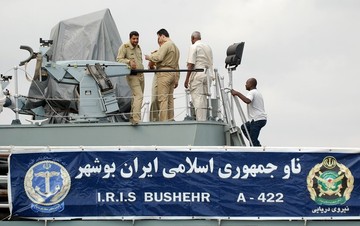Two Iranian navy warships dock in Port Sudan: SAF
May 5, 2014 (KHARTOUM) – The Sudanese Armed Forces (SAF) has announced that two Iranian navy warships docked at Port Sudan in a routine stop that will last for three or four days.
 SAF’s spokesperson, Col. al-Sawarmi Khalid Saad, said the Sudanese Naval Forces (SNF) received the vessels on Monday at Sudan’s sea port, noting one of them is a frigate and the other is a supply ship.
SAF’s spokesperson, Col. al-Sawarmi Khalid Saad, said the Sudanese Naval Forces (SNF) received the vessels on Monday at Sudan’s sea port, noting one of them is a frigate and the other is a supply ship.
“The two ships docked at Port Sudan for refueling and exchange of information with the SNF and they will continue sailing because Sudan is not their main destination but a transit point,” he said.
He pointed that ordinary citizens will be allowed to tour the two ships within the framework of the social contacts and in accordance with the schedule provided by the Iranian authorities which oversee visiting warships.
Since 2012, Port Sudan has become a regular stop for Iranian warships drawing concern by the US and its allies in the Gulf. Khartoum insists that its relations with Iran are based on common interests and not intended to threaten the interests of the Arab Gulf states.
Iran says that In line with international efforts to combat piracy its Navy has been conducting anti-piracy patrols in the Gulf of Aden since November 2008 to safeguard the vessels involved in maritime trade, especially the ships and oil tankers owned or leased by Tehran.
Israel also accuses Sudan of serving as a hub for weapons coming from Iran that are sent to Palestinian militants.
Last March, Israeli navy commandos seized a ship in the Red Sea off the Sudanese coast that was allegedly hiding Syrian-made M-302 surface-to-surface missiles supplied by Iran.
Over the past few years there have been mounting signs of deterioration in relations between Khartoum and Riyadh.
Last March, Sudan’s state minister at the foreign ministry, Kamal Ismail, admitted that there are tensions in Khartoum’s relations with some “friendly” countries, but stressed that this only a temporary situation.
Although the Sudanese official did not name the countries, he was likely referring to Saudi Arabia.
Saudi Arabian banks have also reportedly suspended their dealings with Sudan as of late February.
Last year, Saudi Arabia closed its airspace to the plane carrying Sudanese president Omer Hassan al-Bashir on his way to Iran where he was scheduled to attend the inauguration ceremony of president-elect Hassan Rouhani, thus forcing him and his delegation to return home.
Observers speculated that Sudan’s growing ties with Iran could have irked the Saudis, prompting them to block Bashir’s flight.
The mostly Sunni Muslim Arab Gulf states are wary of Iranian influence in the Middle East, fearing the Shiite-led country is seeking regional dominance that will stir sectarian tensions.
The Syrian conflict has also increased the divide between the two sides, with Arab monarchies supporting the rebels and Iran backing the Al-Assad regime.
Bashir, who performed the Muslim Hajj (pilgrimage) last year, did not meet with King Abdullah bin Abdulaziz during the visit, despite the Saudi monarch holding separate talks with the Turkish and Pakistani presidents who also performed Hajj at the time.
(ST)
